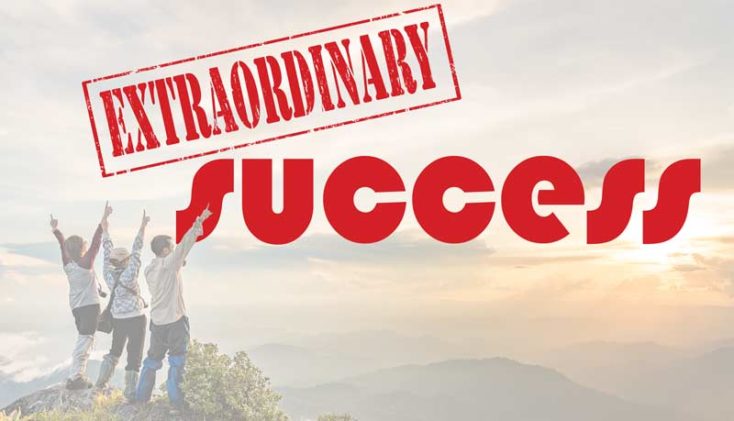The first component of Extraordinary Success is Tenacity.
Tenacity can be defined simply as persistent determination. It is summed up perfectly in this quote from Calvin Coolidge:
Nothing in this world can take the place of persistence. Talent will not: nothing is more common than unsuccessful men with talent. Genius will not; unrewarded genius is almost a proverb. Education will not: the world is full of educated derelicts. Persistence and determination alone are omnipotent.
Tenacity is so directly linked to extraordinary success that the topic–like defining success itself–would be impossible to cover without narrowing the focus. We’ll do that here by focusing our look at tenacity around the core values, culture and purpose we introduced in the Extraordinary Success introduction.
It is important to note that I am not re-inventing the wheel here. I have had the privilege of having dinner with Jim Collins, the author of Good to Great. It is his extensive research that the following principles are built around.
Almost everyone agrees that having core values is a good idea. That is a good start, but keep in mind that most sane people also agree that it is a good idea to eat less, exercise more and make a budget–all good ideas that few people put into practice. The same is true with forming personal and professional core values.
Most people either don’t want to put in the necessary work to develop clearly-defined core values or don’t know how. Many realize how important core values are when put into practice and are afraid they won’t get it right. This leads to two common outcomes:
1. Not attempting to come up with core values
2. Settling for vague, non-specific values and buzzwords that no one remembers. (this is what happens in businesses more often than not. When a company list things like character, integrity, teamwork, etc as their core values without clarifying language to specify what that word means in the context of their particular company, they have probably fallen victim to outcome #2.)
It doesn’t have to be this way. Refining specific core values that drive behavior doesn’t have to be as hard as we make it. Remember, they can be changed if it becomes apparent later that you need to add or remove values that you initially created. I’ve had personal and professional core values for years and just recently added one. That was only possible after living for years with a set of values and realizing through trial-and-error that something was missing. It is important to have the tenacity to go through the process, forge the core values and then live them out.
If you’re not sure where to start, I suggest beginning by asking yourself a question. What are the qualities that I value the most in other people? Maybe you value reliability highly… or perhaps it is good communication… or authenticity. Spend some time asking this question and writing down your answers and you’ll have a head start on defining the core values that are most important to you! For example, I admire people that are continually trying to learn, get better and improve their lives, especially older people as I get older. It shouldn’t come as a surprise then that continual improvement is one of my core values.
Your core values are specific to you. Others may (will) have core values that are quite different from yours. This doesn’t mean that they are less enlightened or somehow less noble. It simply means they are different. There are literally hundreds of traits that could be considered “good” core values. The goal isn’t to claim them all. In fact, the goal is quite the opposite. It is to put in the hard work of digging deep and refining them until you are left with a small handful of values that are pivotal to who you are.
If you work for, hire, do business with or–heaven forbid–marry someone whose core values do not align with your own, you will find yourself in constant inner turmoil and conflict. Click To TweetIt is important, however, that your values align with those with whom you associate. If you work for, hire, do business with or–heaven forbid–marry someone whose core values do not align with your own, you will find yourself in constant inner turmoil and conflict. When you have any of the above associations where the values do align, there is synergy, momentum, and fulfillment.
My challenge for you this week is to be tenacious in committing to the process of developing clearly defined core values for yourself. If you’ve never done it, start with the tips above. If you have some that you know are vague or inadequate, commit to revamping them. If you need help with this process for yourself or your company, feel free to reach out to me. I am passionate about this topic. I have seen just how transformative well-developed core values can be personally and professionally. I would love to discuss how I can help you with yours.
